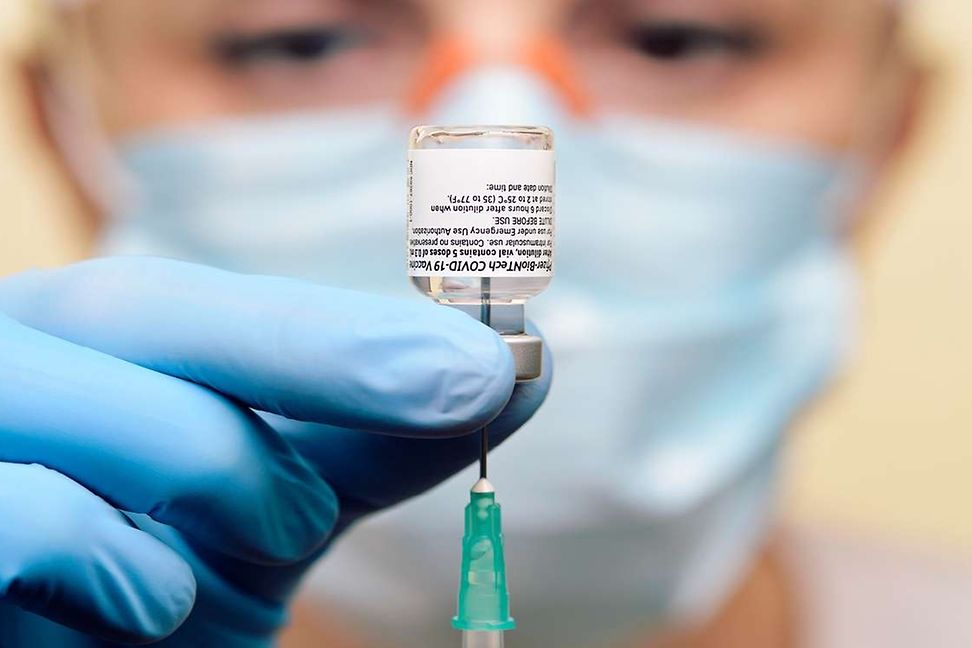在此处更改您的语言和 LGT 位置。
私人客户的数字平台
登入 LGT 智能银行
金融中介机构的数字平台
登入 LGT 智能银行 Pro
常见问题解答 (FAQ)
LGT 智能银行帮助
常见问题解答 (FAQ)
LGT 智能银行专业版帮助
Since the Covid pandemic, the healthcare industry has presented itself as a place where investors can find growth in the midst of a crisis. An overview of the most interesting investments in healthcare - and their history and future.

In 1848, two cousins travelled from the small German city of Ludwigsburg to New York City. Karl Erhart, who was known as Charles, was a confectioner. His cousin was a chemist who had secured a USD 2 500 loan from his father to create a small factory in Brooklyn. The chemist's name was Charles Pfizer.

Trading as Charles Pfizer & Company, the men launched their first product in 1849. Their recipe for santonin, a bitter compound then used to treat intestinal worms, combined their skills. Pfizer looked after the chemistry, while Erhart added an almond-toffee flavouring to make the medicine go down more easily.
The drug did well, but Pfizer might have remained just another name on the long list of German immigrants who made it in 19th century New York. Instead, it would become a global pharmaceutical giant.
Tracing that success - and that of an industry that is increasingly attractive to investors - means understanding an unfortunate truth: healthcare companies tend to thrive in a crisis.
Pfizer's first breakthrough came in 1861, when the outbreak of the US civil war triggered soaring demand for painkillers. Pfizer struck a deal to provide tartaric acid to soldiers in the Union Army, doubling revenues in seven years. At the same time, the other future big pharmaceutical players were emerging, transforming apothecary into an industry that brought together cutting-edge science and mass manufacturing.
More recently, it took only months for Pfizer to double its revenues - from USD 41.7bn in 2020 to USD 81.3bn in 2021. This time the crisis was, of course, the coronavirus pandemic and the arms race it launched for a vaccine.

"When I started, not many investment houses were even looking at biotech," says Dawn Bell, a veteran American biopharma executive who sits on a council that supports life science start-ups at the EU-funded European Institute of Innovation and Technology. "And where they existed, they were geographically focussed. If you were a founder, you had to live near the venture capitalists, and either be a prestigious scientist, or an experienced executive known to the venture capitalists. That's who they picked to trust their money with."
This period favoured established figures and big pharma companies, who also had the financial clout to take on what has traditionally been the biggest area of potential for investment: drug development.
Because it takes at least a billion dollars and a decade to bring a new drug to market. Moreover, despite enormous advances in science and technology, this cost, even when adjusted for inflation, has doubled roughly every nine years, establishing what is known as Eroom's law (the reverse , the observation - and rough measure of technological advancement - that the number of transistors on a circuit doubles every two years).
Yet, even before the pandemic, biotech was enjoying a long bull market and big growth, making the healthcare sector far more diverse - and more attractive to investors outside the traditional bubble. Bell puts this down to the development of better tools, more access to more sophisticated data and ever-increasing computing power.

"The biggest trend has been connected healthcare," adds Malte Stiel, a fixed-income strategist who focuses on sustainability at LGT Private Banking. Systems designed to bolster prevention and ease the burden on doctors are being developed all over the world to increase the provision of remote healthcare and the use of diagnostic wearables and medicine delivery systems connected to apps.
Stiel also points to the rise of social impact bonds that incentivise private investors to finance health schemes. In 2017, Stockholm launched a pioneering scheme in which investors funded prevention strategies for more than 2 000 patients who were at risk of developing Type 2 diabetes. Under such schemes, investors are repaid - with interest - from savings made from reduced public health and disability costs. "It helps the entire healthcare system because it's way cheaper to do the prevention," Stiel says.
Even before the pandemic, Bell was most excited about the way technology is beginning to transform the traditionally ponderous process of drug discovery. "The advancement of these tools is enabling us to unravel biology at a faster pace than we've ever been able to do it before," she says. As one example she points to the "genomics revolution", which spans gene editing, anti-cancer drug development and a host of other functions that involve the study of DNA and the use of data.

Many of the companies involved in this field have shown promising growth prospects - and big returns. The MSCI ACWI Genomic Innovation Index, for example, which was developed with ARK Invest and is made up of 250 companies in the field, has outperformed the benchmark by nearly 50% since 2013. "And the private equity market is flush with cash, with huge capital still to be deployed," Bell says. "How much of that will go to existing companies versus new company creation remains to be seen, but there are still great opportunities in biotech."
There are also more ways to determine the quality of an investment, including those increasingly vital EDG credentials. For example, the Access to Medicine Index, a Dutch not-for-profit funded by several governments and foundations, ranks the 20 largest pharmaceutical companies according to their ability to make their drugs more available, affordable, and accessible in 106 low and middle-income countries.
When the pandemic did arrive, it not only increased opportunities and demand for innovation in healthcare and biotech, but also highlighted the vital importance to society of such research and investment. "I think it also brought in a lot of non-biotech investors who had fewer places to put their money due to the shutdowns," Bell says. "This seemed to be a place where investors could find growth."

Medical device companies, in the burgeoning MedTech industry, did particularly well, pulling in a record USD 9.9bn in venture financing in 2021. Some of these companies were involved in Covid testing, but not all investment was directly inspired by the pandemic; surgery robotics and AI-enhanced cancer diagnosis were among the fields represented at the top end of the funding scale. The pandemic also highlighted the importance of mRNA vaccine development, attracting big new funding in its use to treat cancer and autoimmune diseases.
Bell says the market has settled a little after a wildly exuberant 2021. She sees one advantage in this slow-down in more realistic valuations for potential merger and acquisitions, as many newer biotech and medtech companies seek an exit with a bigger partner who can work on development and commercialisation. She hopes that the new focus on the sector - and the investment opportunities it has inspired - long outlasts the pandemic itself.
Pfizer, meanwhile, continued to do well as it came to dominate the global Covid vaccines market, while also facing criticism for deciding to keep the profits (some of its rivals decided not to). Pfizer made nearly USD 37bn in sales from its Covid-19 vaccine in 2021, making it the biggest moment for the company since two cousins sailed to New York with a modest plan.
Title image: © GettyImages / Andrew Brookes